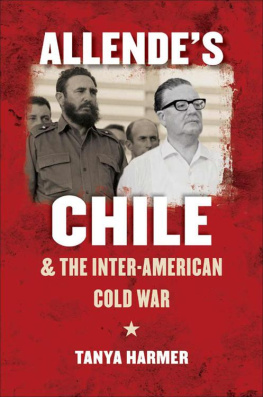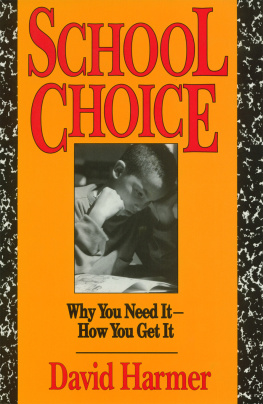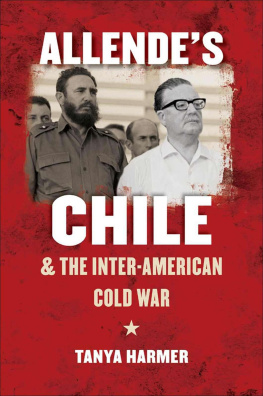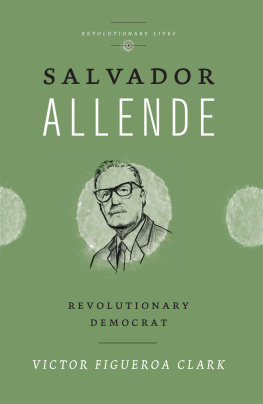Tanya Harmer - Beatriz Allende: A Revolutionary Life in Cold War Latin America
Here you can read online Tanya Harmer - Beatriz Allende: A Revolutionary Life in Cold War Latin America full text of the book (entire story) in english for free. Download pdf and epub, get meaning, cover and reviews about this ebook. year: 2020, publisher: The University of North Carolina Press, genre: Politics. Description of the work, (preface) as well as reviews are available. Best literature library LitArk.com created for fans of good reading and offers a wide selection of genres:
Romance novel
Science fiction
Adventure
Detective
Science
History
Home and family
Prose
Art
Politics
Computer
Non-fiction
Religion
Business
Children
Humor
Choose a favorite category and find really read worthwhile books. Enjoy immersion in the world of imagination, feel the emotions of the characters or learn something new for yourself, make an fascinating discovery.

- Book:Beatriz Allende: A Revolutionary Life in Cold War Latin America
- Author:
- Publisher:The University of North Carolina Press
- Genre:
- Year:2020
- Rating:3 / 5
- Favourites:Add to favourites
- Your mark:
- 60
- 1
- 2
- 3
- 4
- 5
Beatriz Allende: A Revolutionary Life in Cold War Latin America: summary, description and annotation
We offer to read an annotation, description, summary or preface (depends on what the author of the book "Beatriz Allende: A Revolutionary Life in Cold War Latin America" wrote himself). If you haven't found the necessary information about the book — write in the comments, we will try to find it.
Tanya Harmer: author's other books
Who wrote Beatriz Allende: A Revolutionary Life in Cold War Latin America? Find out the surname, the name of the author of the book and a list of all author's works by series.
Beatriz Allende: A Revolutionary Life in Cold War Latin America — read online for free the complete book (whole text) full work
Below is the text of the book, divided by pages. System saving the place of the last page read, allows you to conveniently read the book "Beatriz Allende: A Revolutionary Life in Cold War Latin America" online for free, without having to search again every time where you left off. Put a bookmark, and you can go to the page where you finished reading at any time.
Font size:
Interval:
Bookmark:
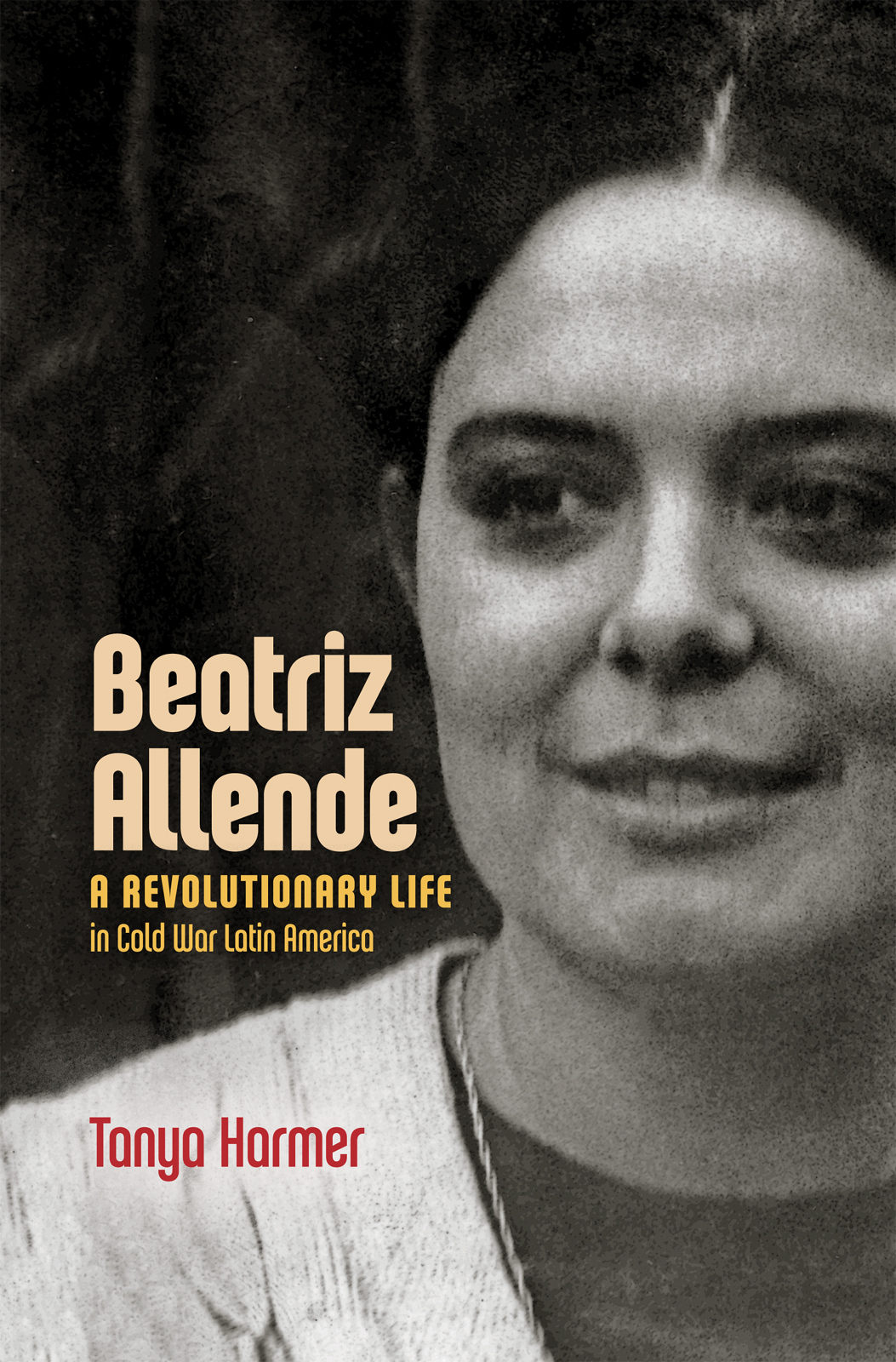
Beatriz Allende
A Revolutionary Life in Cold War Latin America
TANYA HARMER
THE UNIVERSITY OF NORTH CAROLINA PRESS
Chapel Hill
2020 The University of North Carolina Press
All rights reserved
Manufactured in the United States of America
Set in Miller and Klavika types by Tseng Information Systems, Inc.
The University of North Carolina Press has been a member of the Green Press Initiative since 2003.
Cover photograph courtesy of Fundacin Salvador Allende, Santiago de Chile
Library of Congress Cataloging-in-Publication Data
Names: Harmer, Tanya, author.
Title: Beatriz Allende : a revolutionary life in cold war Latin America / Tanya Harmer.
Description: Chapel Hill : The University of North Carolina Press, 2020. | Includes bibliographical references and index.
Identifiers: LCCN 2019046694 | ISBN 9781469654294 (cloth) | ISBN 9781469654300 (ebook)
Subjects: LCSH: Allende, Beatriz. | SocialistsChileBiography. | RevolutionariesLatin AmericaBiography. | ExilesCubaBiography. | Suicide victimsBiography.
Classification: LCC F3101.A39 H37 2020 | DDC 983.06/46092 [B]dc23
LC record available at https://lccn.loc.gov/2019046694
For Tom
Beatriz Allende

Sitting in his home in Havana, Luis made me the strong, sweet coffee you instantly miss when you leave Cuba. We had taken a break from discussing his career in Cuban intelligence and begun to talk a bit about our lives. There, hanging next to the table we sat around, was a framed picture of a young woman. I knew it was Beatriz Allende and that the man I was talking with, Luis Fernndez Oa, had been married to her. I knew that Beatriz was the revolutionary daughter of Chiles socialist president, Salvador Allende. And I knew she had died in Cuba after a right-wing military coup in 1973 deposed her fathers democratically elected government.
Over the many hours I had spoken to Luis before this, Beatrizs name had also come up sporadically as someone who had worked in Allendes presidential administration, had intimate links to Cubas leaders, and had mediated relations between them. But for the most part she had remained a smiling, tragic, and mysterious presence watching over us as we delved into Luiss memories of revolution in Cold War Latin America.
It was only years after we first metdrinking coffeethat I finally broached the possibility of learning more about Beatriz. Compared with our earlier conversations, I now felt more confident asking Luis difficult questions. I had interviewed him in the stifling Cuban heat, made more oppressive when power cuts stopped the fan next to us. The tape recorder that had once sat awkwardly between us had also become a habitual and forgotten accessory.
I therefore seized the opportunity to ask Luis about his relationship with Beatriz, about the role she played in Chiles revolutionary past, and why she died so young. The answers he gave me only raised more questions. And that is where a decade-long project to write a history of her life began.
That it had taken me so long to ask him about her also spoke to the way, like so many other women in Latin Americas revolutionary history, Beatriz had been subsumed within narratives driven by men. Historians, myself included, had found it hard to situate women like her who held offstage, but highly influential, roles. And we had rarely probed their historical significance.
Inevitably, the more I learned about Beatriz, the more she showed herself to be a protagonist worthy of study in her own right: a revolutionary who revealed the promises, paradoxes, and problems of a revolutionary age. The more I delved into her life, the more I also understood her in relation to the world she came from and the times she lived through. In turn, the lens Beatriz provided opened up these times to me. She witnessed remarkable changes in Chile, Cuba, and Latin Americachanges determined by the rise and fall of a revolutionary moment stretching from the late 1950s to the early 1970s. And she helped drive these forward while ultimately being consumed by them. Yet to comprehend her as a revolutionary, her milieu and her world required further research. In turn, Beatrizs story became the history of her life and an account of revolutionary times told from her perspective. Combining the personal and political, it is about a life in its context: a new textured history of revolution in Chile at the height of Latin Americas Cold War and how it impacted a life.
Born on 8 September 1942, Beatriz Ximena Allende Bussi was the second of Salvador Allende and Hortensia Bussis three daughters. She had a middle-class, left-wing upbringing in Santiago before going on to study medicine and work in public health as a pediatrician and university lecturer in her late twenties. When her father won Chiles presidential election in September 1970 as the head of a left-wing coalition seeking to bring about a peaceful, democratic transition to socialism, she left medicine to work full-time as his private secretary. It was an easy decision. Beatriz had been politically active from a young age, accompanying her father on his numerous election campaigns for senator and president in the 1950s and 1960s. As a member of the Chilean Socialist Party, she had actively participated in its youth section and the Brigada Universitaria Socialista (Socialist University Brigade, BUS). And, in doing so, she formed part of a radicalized generation of young Chileans deeply inspired by the Cuban Revolution. After Ernesto Che Guevaras death in Bolivia in 1967, she had also been a leading figure in the attempt to instigate a second transnational guerrilla insurgency in that country. And she was close to the Movimiento de Izquierda Revolucionaria (Revolutionary Left Movement, MIR), which stood to the left of the Communist and Socialist Parties in Chile.
Together, this combinedbut dividedLeft forged one of the most significant experiments of socialist transformation in twentieth-century Latin America: la va chilena al socialismo (the Chilean road to socialism). However, on 11 September 1973 it came to an abrupt end. That day, a military coup brought a seventeen-year dictatorship to power. Led by General Augusto Pinochet, it would destroy Chiles constitutional democratic past, forcing the country toward neoliberalism, killing more than three thousand, and torturing at least forty thousand more. Beatrizs lifeand the lives of everyone she knewchanged irrevocably. Her father and many of her friends died as a result, as did the revolutionary future she had worked toward for over a decade.
As an exile in Havana, living with Luis and their two young children, she subsequently worked tirelessly as a figurehead for the global solidarity campaign with Chileans resisting the dictatorship. Then, in 1977, when Pinochets regime was at its strongest, having decimated the countrys left-wing parties and consolidated its institutional power, Beatriz took her own life. She was thirty-five years old.
Brief as it was, Beatrizs life contains multitudes of historical meaning. On one level, she exemplified the Cuban Revolutions influence on young Latin Americans. Like so many of her generation, frustrated by underdevelopment, poverty, inequality, and the pace of transformation at home, she was drawn to the idea of armed struggle and internationalism la Cuba as a way of bringing about decisive change. Her experience is therefore representative of the rise of a particular revolutionary project that emerged in the late 1950s and 1960s and its power to shape militancy, behavior, friendships, and romance. On another level, Beatriz was also a loyal collaborator and confidant to her fathers democratic experiment to move Chile along a
Font size:
Interval:
Bookmark:
Similar books «Beatriz Allende: A Revolutionary Life in Cold War Latin America»
Look at similar books to Beatriz Allende: A Revolutionary Life in Cold War Latin America. We have selected literature similar in name and meaning in the hope of providing readers with more options to find new, interesting, not yet read works.
Discussion, reviews of the book Beatriz Allende: A Revolutionary Life in Cold War Latin America and just readers' own opinions. Leave your comments, write what you think about the work, its meaning or the main characters. Specify what exactly you liked and what you didn't like, and why you think so.

